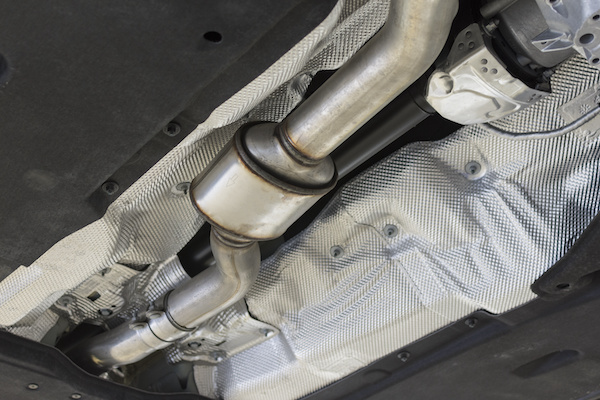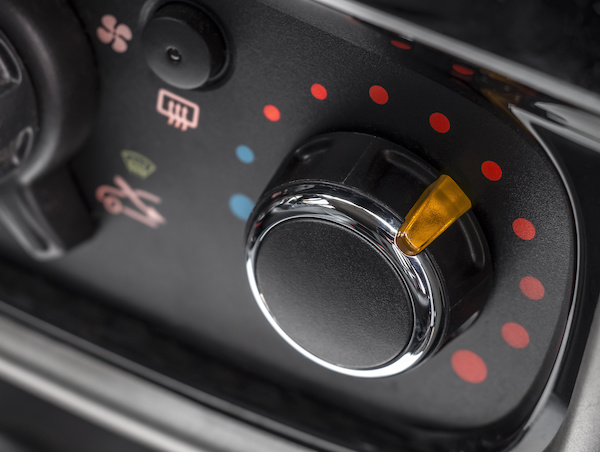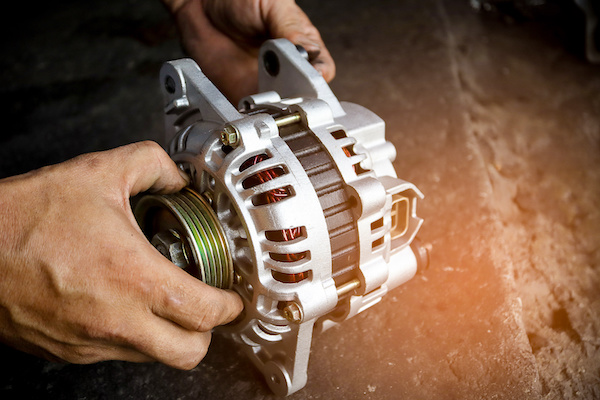Posted on 12/21/2021

What Does A Catalytic Converter Do? A catalytic converter is something many car owners are familiar with when it comes to their vehicles. It is often that part that is causing a car not to pass an emissions test or is the reason behind an illuminated check engine light. Its job is extremely important and ensures the proper operation of your vehicle overall. It's important to know about a catalytic converter, and what it means for your car. The catalytic converter is a part found on any modern-day car that helps to deal with the pollutants and noxious gasses released by a car's engine. Simply put, this is a chemical process that converts those pollutants and noxious gasses into a less-harmful form. Harmful chemicals such as carbon monoxide and nitric oxide are converted into their less harmful forms such as water vapor and carbon dioxide. The inside of the catalytic converter will often have precious metals such as palladium, rhodium, an ... read more
Posted on 11/24/2021

There's truly nothing more breathtaking than seeing the autumn leaves contrasting with the Denver, CO, mountains. However, when these leaves start to fall, they can be a real burden for you and your vehicle. You might not think about it, but fall leaves can damage your car. First of all, they present many dangers on the roadways, making it more difficult for your wheels to grasp the road. As a result, you may slip, slide, and have a hard time braking. Furthermore, the leaves can damage the paint on your vehicle. If these leaves sit on your car for an extended amount of time, they can damage your paint. The damage is due to the substances found on leaves, like pollen, sap, and acid. Leaves can do more than just external damage – they can also do a number on your internal parts. To begin with, they can clog up your air filter, leading to dirty and inefficient airflow. The autumn petals can also clog the drains in your vehicle. Therefore, to prevent any sort ... read more
Posted on 10/20/2021

With fall and winter coming, you're going to depend more and more on your heater. The heater core is an integral part of your car's cooling system. Hot engine coolant enters the heater core. After, the blower motor then pushes air through the heater core, transferring the heat from the hot coolant to your cabin. The heater core is intended to last as long as the vehicle; however, accidents can happen, and things don't always go as planned. Over time, the equipment can become clogged or form leaks. Whenever there is a problem with your heater core, you'll likely notice at least one of the following symptoms: No Heat As this may be obvious, a damaged heater core can cause your vehicle's heater to perform poorly. In other words, your cabin won't be as toasty as you'd like on those chilly fall days. Film or Fog on the Windshield A malfunctioning heater core can also let the windshield fog up as coolant gas travels through the defrost vents. If you catch a s ... read more
Posted on 9/21/2021

Having your automobile break down is most drivers' biggest fear, and it can be particularly scary if you've never experienced it before (knock on wood). If you have no clue what to do in this sort of situation, it can lead to accidents and injuries. Although a breakdown is never not stressful, the first thing to do is not to panic! Here are some of our tips on how to handle a vehicle breakdown. Tip 1: Turn on your hazards The first thing you should do is switch on your emergency or hazard signal. Doing so will send a distress signal and warn others of your presence. Other drivers will be notified of your whereabouts and be able to get around you safely. Tip 2: Get off the road If you get a couple of hints before your car completely breaks down, your first instinct should be to get the heck out of traffic. The road shoulder is one of the safest areas to deviate to. Once there, you can call for vehicle assistance. Tip 3: Turn your car off once it is still. It ... read more
Posted on 8/23/2021

Labor Day weekend is considered the mark of the end of the summer, and most families like to squeeze in one last vacation before the kiddos are back in school. Whether you plan to be at the beach or lake or host a BBQ, you will likely run into some traffic this holiday as more people are out celebrating. It is critical to prioritize your and your loved ones' safety and do what you can to have fun this Labor Day weekend. Here are some tips that Mancinelli's Auto Repair Center has to offer to ensure your safety: Stay alert of your surroundings. Labor Day is among one of the most dangerous holidays to drive in the United States, primarily due to heavy traffic and increased drunk drivers. Practice defensive driving. Maintain a safe distance between drivers, especially when driving on the freeway. Another way to practice defensive driving is to wait a couple more seconds when waiting at a stop sign or stoplight before darting through an intersection. Pl ... read more
Posted on 7/16/2021

What is an Alternator? An alternator is a fundamental component of your car as it is responsible for converting mechanical energy from the engine into electrical energy. The reason it is called an alternator is that it generates an alternating current that turns periodically. The electrical charge is sent to restore your battery life which powers your vehicle's electrical systems. Without an operational alternator, your engine will abruptly stop working. Symptoms of a Bad Alternator The alternator comprises many components such as bearings, rotors, stators, fans, and other internal parts. Over time these pieces get worn out. Whenever it does, you should stop by the auto repair shop pronto. Besides a stalling engine, here are the other signs that indicate you need an alternator repair or replacement: Fuzziness or Flickering of Interior & Exteriors Lights The alternator generates the power necessary for the functionality of your car's interior and e ... read more
Posted on 6/28/2021

Most of us throw random junk in our car trunks without even thinking, and before you know it, piles begin to accumulate. Next thing you know, you are playing a game of Tetris in your grocery store parking lot. Though it may not seem like a problem at first, it could get embarrassing when exposed in public. An overpacked trunk can also decrease your vehicle’s fuel efficiency due to the heavy load. So here are a few of our tips for organizing your car and maximizing your space: Trunk Nets - Most trunks have some sort of nets and hooks to help with storing miscellaneous items. Outside of what may already be included with your vehicle, you can buy an additional trunk net to help things stay in place. Collapsible Storage Baskets - These flexible storage bins are great because you can store them efficiently when not in use. They easily fold open and close whenever you please. If you are concerned about them sliding in your trunk, use sticky velcro to keep them fastene ... read more
Posted on 5/26/2021
.jpeg)
The suspension system of your vehicle is well known for keeping its movement stable and smooth. It does a lot more than just prevent bumps in the road from being felt, however. Properly functioning suspension reduces the centrifugal forces felt when turning or the dipping experienced when braking. Working suspension is important for maintaining a safe vehicle that can turn and brake correctly. Signs of Failing Suspension The suspension keeps your vehicle stable, so it's usually easy to tell if it's beginning to experience problems because it can be felt while driving the vehicle. Some of the most common signs of failing or faulty suspension include: Rough driving Drifting during turns Increased difficulty turning Dipping during braking Vehicle lower on one corner or side Oily shock absorbers Failing suspension impacts the smoothness of movement and it becomes possible to feel every bump in the road. This is often one of the first and most prominent signs that you need t ... read more
Posted on 4/26/2021
.jpeg)
Spark plugs are components of a vehicle engine made with durable materials that can withstand multiple explosions before they wear out and start producing weaker sparks. The plugs produce electric sparks that ignite the fuel and air mixture in the engine cylinders. The spark plugs are an essential part of the ignition system and have a limited lifespan. Without functioning spark plugs, your vehicle may not move because it needs the combustion process possible with the energy produced by the plugs. It will require the expertise of a professional to replace the faulty plugs that are identified by: Engine Misfires Malfunctioning spark plugs can make an engine stop for a while and resume its normal functioning. It can happen when you are driving. The engine can also sound rough when idle. The misfires affect the proper functioning of your car's engine due to failing spark plugs that have no power to ignite the fuel-air mixture. Taking your car to a well-known au ... read more
Posted on 3/17/2021
.jpeg)
The TPMS warning light alerts you when your vehicle's tire is over or under-inflated, creating a serious safety concern. By the time the TPMS warning light illuminates on the dashboard, the tires pressure is way below or above the manufacture's recommendation range (and what is considered a safe operational level). Under inflation causes reduced tire performance, tire overload and excess heat buildup. An underinflated tire often shows signs of premature wear, particularly on either side of the tread edges. On the other hand, over-inflated tires have poor traction with the ground, leading to premature wear and inability to absorb road impacts. Can I Drive with my Car's TPMS Warning Light On? A more straightforward answer to this question is no. Do not ignore your vehicle's Tire Pressure Monitoring Systems warning light-you could be getting a flat. Once you notice the little light with an exclamation mark flashing on your dashboard, you should being your vehicle into o ... read more